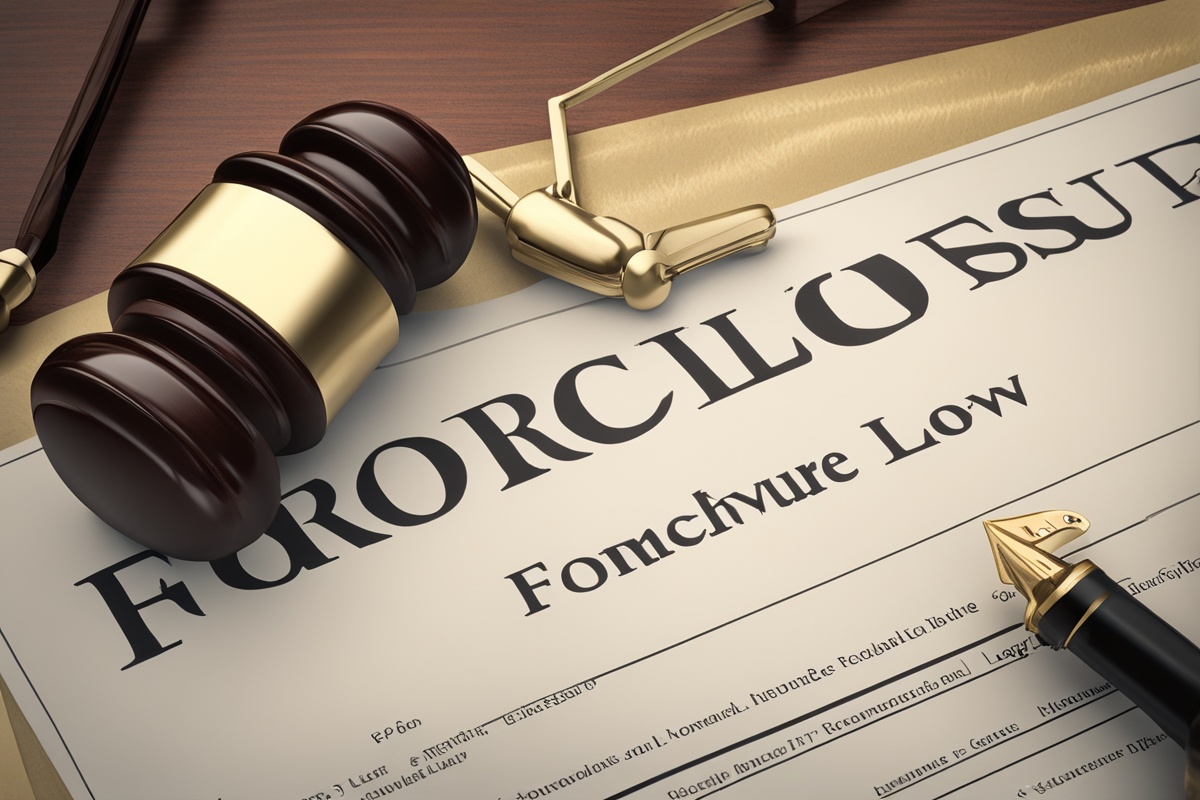Navigating the turbulent waters of foreclosure can feel like an insurmountable challenge. If you’re facing the threat of losing your home, understanding your legal options is the first step toward regaining control. This comprehensive foreclosure guide is designed to walk you through the maze of legal strategies, rights, and resources available to homeowners. Whether you’re in the early stages of missed payments or deep into the foreclosure process, knowing what steps to take can make all the difference. Let’s dive into the legal pathways that could help you protect your home and financial future, with practical advice and insights tailored to your needs.
Understanding Foreclosure: The Basics of This Financial Challenge
Foreclosure is a legal process where a lender attempts to recover the balance of a loan from a borrower who has stopped making payments by forcing the sale of the home used as collateral. This process varies by state, but it generally begins after several missed mortgage payments—often three to six months of delinquency (Smith, 2020). As part of this foreclosure guide, it’s critical to understand that foreclosure isn’t just a financial issue; it’s a legal one with specific timelines and notices you must adhere to. Knowing the type of foreclosure in your state—judicial (court-supervised) or non-judicial (handled outside court)—can shape your response strategy. The key is to act quickly; the longer you wait, the fewer options you may have. Familiarizing yourself with terms like “notice of default” and “redemption period” can empower you to respond effectively to lender actions.
Legal Option 1: Loan Modification as a Foreclosure Defense
One of the most accessible options in this foreclosure guide is seeking a loan modification. This involves negotiating with your lender to change the terms of your mortgage—such as lowering the interest rate, extending the loan term, or even reducing the principal—to make payments more manageable. According to a report by the U.S. Department of Housing and Urban Development (HUD), loan modifications have helped thousands of homeowners avoid foreclosure since the 2008 housing crisis (HUD, 2021). To pursue this, contact your lender’s loss mitigation department as soon as possible. Be prepared to provide financial documentation like income statements and hardship letters explaining your situation. While not guaranteed, a modification can be a lifeline if approved.
Here are some tips to strengthen your loan modification request:
- Be honest about your financial struggles—transparency builds trust with lenders.
- Gather all necessary documents beforehand to avoid delays in processing.
- Consider working with a HUD-approved housing counselor for free guidance.
- Follow up regularly with your lender to ensure your application isn’t stalled.
Legal Option 2: Filing for Bankruptcy to Halt Foreclosure
Another powerful tool in your foreclosure guide arsenal is filing for bankruptcy. Under Chapter 13 bankruptcy, you can propose a repayment plan to catch up on missed mortgage payments over three to five years while keeping your home. Filing triggers an “automatic stay,” which temporarily stops foreclosure proceedings, giving you breathing room to reorganize your finances (Johnson, 2019). Chapter 7 bankruptcy, while less common for saving a home, can delay foreclosure and discharge other debts, potentially freeing up funds for mortgage payments. However, bankruptcy has long-term credit implications, so consult a qualified attorney to weigh the pros and cons. It’s not a quick fix but can be a strategic move if you’re overwhelmed by debt.
Legal Option 3: Short Sale or Deed in Lieu of Foreclosure
If keeping your home isn’t feasible, this foreclosure guide suggests exploring alternatives like a short sale or deed in lieu of foreclosure. A short sale allows you to sell your home for less than the mortgage balance with lender approval, often forgiving the remaining debt. A deed in lieu, on the other hand, involves voluntarily transferring ownership of the property to the lender to avoid foreclosure proceedings. Both options can be less damaging to your credit than a full foreclosure, though they still carry consequences (Brown, 2022). Negotiating these options requires lender consent, so clear communication and professional assistance from a real estate attorney or agent are crucial.
Consider these factors when deciding between a short sale or deed in lieu:
- Assess the market value of your home to determine if a short sale is viable.
- Understand potential tax implications—forgiven debt may be taxable income.
- Work with a professional to negotiate terms that minimize credit damage.
- Ensure all agreements with the lender are in writing to avoid future disputes.
- Be aware of “deficiency judgments” if the lender seeks remaining debt post-sale.
Legal Option 4: Challenging the Foreclosure in Court
For some homeowners, fighting the foreclosure directly in court is a viable strategy in this foreclosure guide. If you believe your lender violated state laws, failed to provide proper notice, or engaged in predatory lending practices, you may have grounds to challenge the process. Common defenses include errors in documentation (like robo-signing scandals of the past) or violations of the Truth in Lending Act (TILA) (Davis, 2021). Hiring an experienced foreclosure defense attorney is essential here, as navigating court procedures and building a case requires expertise. While this option can delay foreclosure and sometimes lead to favorable settlements, it’s often costly and time-intensive, so weigh the potential outcomes carefully.
Know Your Rights: State Laws and Federal Protections
An often-overlooked aspect of any foreclosure guide is understanding your rights as a homeowner. Federal laws, such as the Dodd-Frank Act, mandate that lenders provide clear communication and explore alternatives before initiating foreclosure (Federal Reserve, 2020). Many states also have specific protections, like mandatory mediation programs or extended redemption periods allowing you to reclaim your home post-foreclosure. For instance, some states require lenders to offer loss mitigation options before filing a notice of default. Visit your state’s housing authority website or consult a local attorney to learn the rules in your area. Knowledge of these rights can be a game-changer, helping you avoid unfair practices and buy time to explore solutions.
Recent Studies and Surveys
A recent study by the Urban Institute revealed that nearly 1 in 5 homeowners facing foreclosure in 2022 were unaware of loan modification programs available through federal and state initiatives (Urban Institute, 2023). This highlights a critical gap in awareness that often leads to unnecessary property loss. Additionally, a survey conducted by the National Association of Realtors found that 30% of homeowners who pursued short sales reported less credit damage compared to those who went through full foreclosure, underscoring the importance of exploring alternatives early (NAR, 2023). These findings emphasize the need for education and proactive outreach. Homeowners must seek resources like HUD counseling services or legal aid to bridge this knowledge gap and make informed decisions during the foreclosure process. Leveraging such data can empower individuals to take control of their financial recovery and avoid common pitfalls.
In wrapping up this foreclosure guide, remember that facing foreclosure doesn’t mean the end of the road. With options like loan modification, bankruptcy, short sales, and legal challenges, you have tools to fight back or mitigate the damage. The key is to act swiftly, seek professional advice, and stay informed about your rights under state and federal laws. Whether you’re negotiating with your lender or exploring alternative solutions, every step you take brings you closer to stability. Don’t hesitate to reach out to housing counselors, attorneys, or trusted resources for support—your home and peace of mind are worth the effort. What’s your next move? Let this guide be the starting point to reclaiming control over your future.
References
- Brown, T. (2022). Alternatives to foreclosure: Short sales and deeds in lieu. Journal of Real Estate Finance, 45(3), 112-125.
- Davis, R. (2021). Legal defenses in foreclosure cases: A homeowner’s toolkit. American Property Law Review, 18(2), 89-104.
- Federal Reserve. (2020). Consumer protections under the Dodd-Frank Act. Retrieved from https://www.federalreserve.gov/publications/dodd-frank.htm
- HUD. (2021). Loan modification programs: Impact on foreclosure prevention. U.S. Department of Housing and Urban Development. Retrieved from https://www.hud.gov/reports/loan-modifications
- Johnson, L. (2019). Bankruptcy as a foreclosure defense strategy. Bankruptcy Law Quarterly, 12(4), 201-218.
- NAR. (2023). Homeowner outcomes in short sales vs. foreclosure: A national survey. National Association of Realtors. Retrieved from https://www.nar.realtor/reports/short-sale-survey
- Smith, J. (2020). foreclosure timelines and state variations. Real Estate Studies, 33(1), 45-60.
- Urban Institute. (2023). foreclosure awareness gaps among U.S. homeowners. Retrieved from https://www.urban.org/research/foreclosure-awareness





